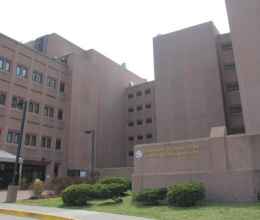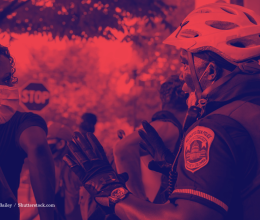
COVID-19 poses an unprecedented threat to a group of District of Columbia residents in the custody of the District of Columbia Department of Corrections (“DOC”). In the final week of March 2020, the DOC announced five positive cases from different units in its facilities. The risk of rapid and pervasive infection is high. Indeed, the virus already appears to be spreading exponentially, from one positive test on March 25, to two positive tests on March 27, to four positive tests on March 28, and a fifth positive case on March 29.
The risk of mass contagion in the Central Detention Facility and Correctional Treatment Facility — DOC’s two interconnected jails — facilities is high, and the effects of the outbreak will be devastating. Many cases can result in horrible pain, fevers, diarrhea, and difficulty breathing. More serious cases will require hospitalization, and severe cases can cause death or permanent lung and heart conditions. Among adults with preexisting medical conditions like high blood pressure, asthma, and diabetes — features that disproportionately characterize incarcerated people — the hospitalization and death rates are greatly elevated.
With over 1,600 vulnerable residents in their care and months to prepare for this coming catastrophe, the Department of Corrections has proven that it will not, and cannot, ensure the reasonable health and safety of its residents. The evidence includes:
- Declarations from residents in DOC facilities who detail the days-long delays before they can receive medical care, the lack of soap, hand sanitizer, and disinfectant, the policies that require large groups of residents to congregate in close proximity, the lack of testing of residents showing symptoms, and the lack of personal protective equipment for staff and residents;
- Declarations from attorneys and investigators of the Public Defender Service for the District of Columbia (“PDS”), who witnessed first-hand the DOC’s failures to implement effective visitor and staff screening procedures, all but ensuring the virus’s introduction to DOC facilities; and
- Expert declarations from Dr. Jaimie Meyer, Assistant Professor of Medicine at Yale School of Medicine and former Infectious Disease physician for York Correctional Institution in Connecticut, and Dr. Marc Stern, an internist who most recently served as the Assistant Secretary of Health Care for the Washington State Department of Corrections. Drs. Meyer and Stern explain that the virus will spread rapidly in the DOC; that the DOC’s response has been, and is, entirely lacking; and that downsizing the incarcerated population is the best solution to ensure the safety of residents, staff, and the community.
This evidence, damning on its own, is all the more troubling because it is confirmed by reports from DOC staff, who report that, even as of March 25, 2020, DOC staff have “no masks, insufficient gloves, no gowns, no disinfectants, and no comprehensive cleaning occurs on a regular basis.” They go on to identify the failure of the DOC to screen even new residents coming into the jail for COVID-19 and the failure of the DOC to provide social distancing between residents.
The cumulative result of DOC’s failings is, in the professional judgment of Dr. Meyer, that the DOC is “dangerously under-equipped and ill-prepared to prevent and manage a COVID-19 outbreak, which would result in severe harm to detained individuals, jail and prison staff, and the broader community.” In reaching that conclusion, Dr. Meyer identified the following problem areas: cleaning and disinfecting practices; hygiene; personal protective equipment; screening of inmates, staff, and visitors; social distancing; management of the disease in the facility; sufficiency of isolation spaces; and medical care for other health conditions.
On March 30, 2020, the ACLU-DC and the Public Defender Service for the District of Columbia filed a class action lawsuit on behalf of all the detainees in D.C.’s jails. The same day, Plaintiffs sought a temporary restraining order and preliminary injunction directing Defendants to take all actions within their power to reduce the inmate population of CDF and CTF and appointing an expert to effectuate the rapid downsizing of those facilities, consistent with CDC guidance. Plaintiffs also asked the Court to require Defendants to immediately implement new procedures that will bring the DOC in compliance with expert guidance, and to appoint an independent monitor to ensure such compliance.
Over the course of the following three weeks, plaintiffs produced additional declarations from prisoners and jail staff documenting conditions at the CDF and CTF, received amicus support from the union representing the guards at the jail, provided supplemental briefing to the Court, and argued for relief at three hearings. On April 9, the Court appointed two independent experts as amici curiae (friends of the court) to conduct unannounced inspections of the jail.
On April 19, 2020, based on the experts’ report, the Court issued a TRO granting much of the relief plaintiffs requested regarding conditions at the jail. The Court found that DOC had exposed prisoners to an unreasonable risk of damage to their health and further had shown deliberate indifference to prisoners’ health and safety. The Court found that the independent expert report confirmed many of plaintiffs’ allegations, including deficiencies regarding social distancing, the provision of cleaning supplies, visitor screening, education of prisoners and staff about proper precautions including the use of personal protective equipment , the imposition of punitive conditions in isolation units, lack of access to confidential legal calls, and prompt medical care. Accordingly, the Court’s TRO ordered DOC to make immediate conditions improvements in each of these areas.
As the Court explained, “Plaintiffs have provided evidence that Defendants are aware of the risk that COVID-19 poses to Plaintiffs’ health and have disregarded those risks by failing to take comprehensive, timely, and proper steps to stem the spread of the virus.” The Court further recognized “the gravity of Plaintiffs’ asserted injury” and therefore found that Plaintiffs faced irreparable harm in the absence of immediate relief.
The Court-appointed experts returned to the Jail in early May to assess compliance with the TRO. The experts’ oral report to the Court on May 11 was deeply troubling, finding deficiencies in medical care, conditions in isolation units, social distancing, sanitation, and access to legal calls. For instance, the experts documented that days could pass before a resident submitting a “sick call slip” would receive medical attention. In a third of slips analyzed by the experts, it took three or more days after a resident requested help for medical staff to respond. One resident was made to wait over a week after submitting a request for medical help before he was seen. Of particular concern, experts documented this pattern of delay for COVID-19-related symptoms, including coughing, shortness of breath, loss of taste, and fever; two-thirds of those requests were not responded to until over two days after they were submitted.
On May 15, we moved for a preliminary injunction that would extend and expand the relief ordered in the April TRO.
On June 18, the court granted our motion in part and issued a sweeping preliminary injunction requiring the District continue to improve conditions, because, even after months of the pandemic and months of litigation including the prior TRO, “Plaintiffs have produced evidence that inadequate precautionary measures at DOC facilities have increased their risk of contracting COVID-19 and facing serious health consequences.” The preliminary injunction mandates that DOC provide prisoners with medical care within 24 hours, enforce Centers for Disease Control policies on social distancing, provide prisoners with necessary materials to clean their cells and instruction on how to use them, ensure access to confidential legal calls, and improve isolation conditions for those exposed to COVID-19 so that they are non-punitive and specifically allow for access to legal calls, personal calls, daily showers, and clean clothes.
In July 2020, the government both appealed the preliminary injunction and asked the district court to reconsider it. The appeal was stayed while the district court reconsidered, including reappointing the experts to assess the Jail’s compliance throughout the fall of 2020. In January 2021, the court denied the motion to reconsider, citing the experts’ findings of continued deficiencies regarding medical care, COVID testing, social distancing, and the confidentiality of legal calls. The court concluded, “Justice does not require reconsideration of an order ... with which Defendants have failed to comply.”
In July 2021, the court of appeals dismissed DOC’s appeal of the preliminary injunction, ruling (as DOC urged) that the injunction actually expired in September 2020 under the terms of the federal Prison Litigation Reform Act. Importantly, however, the court did not say (as DOC argued) that the injunction should not have been entered or that individuals are not entitled to protection from contagious diseases while incarcerated, nor did the court find any fault with the district court’s appointment of independent inspectors to shed light on the dangerous and troubling conditions in the Jail. Back in the trial court, the parties began discovery in the summer of 2021.
In February 2022, we reached a settlement agreement under which DOC agreed to specific improvements in seven areas and to five unannounced inspections over a six month period by an infectious disease specialist, selected jointly by the plaintiffs’ lawyers and DOC, to confirm compliance. The areas for improvement are:
- Sanitation and hygiene, including residents’ access to cleaning supplies
- Promptness of medical care for COVID-19 related symptoms
- Masking for staff
- Contact tracing for jail residents and staff who test positive for the virus
- Social distancing
- Reasonable access to showers and recreation, including outdoor and outside-of-cell time
- Ensuring that residents on medical quarantine and isolation units are not subjected to punitive conditions that would discourage reporting of symptoms
The settlement also requires regular reporting by DOC about vaccination rates, infection rates, and written policies for responding to the pandemic.
We have moved the court to certify the class for settlement and approve the agreement (as is required for class action settlements); class members will be notified about how to make their voices heard in the process.
We are hopeful that this agreement will put DOC on track to ensure appropriate preventative measures are in place to protect residents from the ongoing pandemic and that this litigation sends a strong message about the government’s responsibility to attend to the health and well-being of the people it incarcerates.
On April 12, 2022, the court approved the settlement.
